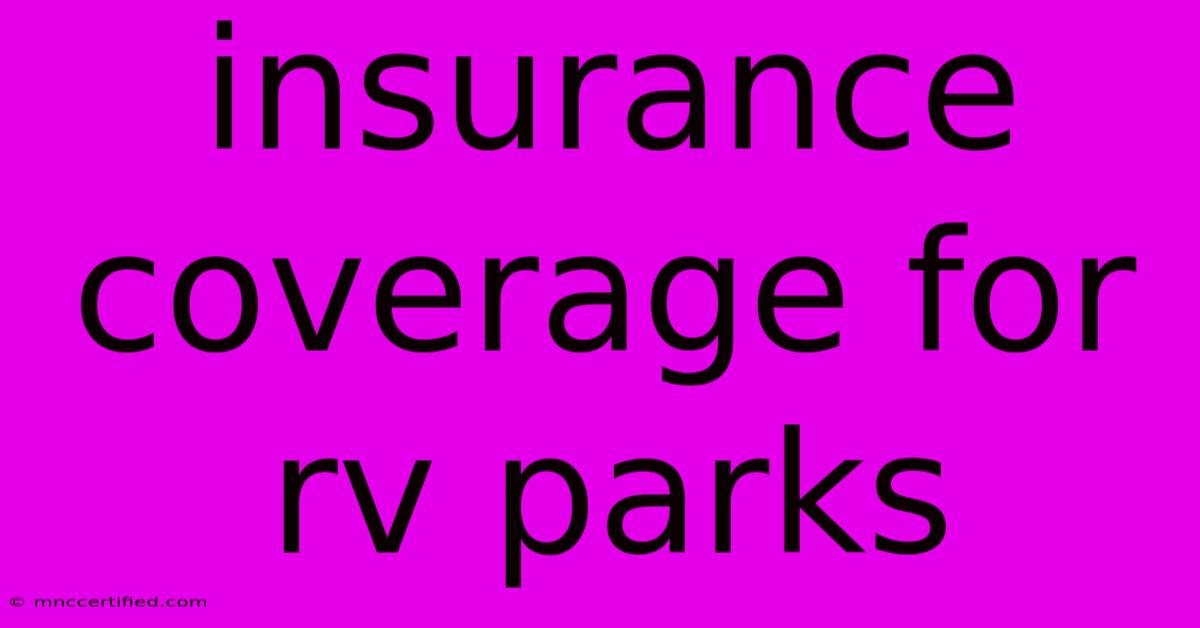Insurance Coverage For Rv Parks

Table of Contents
Insurance Coverage for RV Parks: A Comprehensive Guide
Owning and operating an RV park is a rewarding venture, but it comes with significant risks. Protecting your investment and your guests requires a robust insurance strategy. This comprehensive guide explores the essential insurance coverages every RV park owner needs to consider. Understanding these policies can safeguard your business from financial ruin due to accidents, liability claims, and unforeseen events.
Key Insurance Types for RV Parks
Several insurance policies are crucial for comprehensive protection. Failing to secure the right coverage could leave you vulnerable to substantial financial losses. Let's delve into the specifics:
1. General Liability Insurance: The Foundation of Your Protection
This is the cornerstone of your insurance strategy. General liability insurance protects your RV park from claims of bodily injury or property damage caused by your operations. This includes:
- Bodily injury: Injuries sustained by guests on your property, such as slips, trips, or falls.
- Property damage: Damage to guest property, such as damage to RVs or personal belongings.
- Advertising injury: Claims related to copyright infringement or defamation.
Importance: Accidents happen. A single significant injury claim could bankrupt your business without adequate general liability coverage.
2. Commercial Property Insurance: Protecting Your Assets
Your RV park's physical assets – buildings, infrastructure, amenities – represent a substantial investment. Commercial property insurance covers losses from:
- Fire: Damage or destruction caused by fire.
- Windstorm: Damage from high winds and other weather-related events.
- Vandalism: Damage caused by malicious acts.
- Theft: Loss of property due to theft.
Importance: Replacing damaged or destroyed buildings and infrastructure is incredibly costly. This insurance protects your investment.
3. Umbrella Insurance: Expanding Your Coverage
While general liability insurance provides a base level of protection, unexpected events can lead to claims exceeding your policy limits. An umbrella liability policy provides an additional layer of coverage, extending your liability protection significantly.
Importance: This acts as a safety net, shielding you from catastrophic financial losses due to large liability claims.
4. Workers' Compensation Insurance (If Applicable): Protecting Your Employees
If you employ staff, workers' compensation insurance is mandatory in most jurisdictions. This coverage protects your employees in case of work-related injuries or illnesses, covering medical expenses and lost wages.
Importance: Failure to secure proper workers' compensation insurance can result in significant penalties and lawsuits.
5. Liquor Liability Insurance (If Applicable): For Parks with Alcohol Sales
If your RV park offers alcohol sales, you'll need liquor liability insurance. This coverage protects you against claims arising from alcohol-related incidents, such as drunk driving accidents or injuries caused by intoxicated guests.
Importance: Serving alcohol significantly increases your liability exposure. This specialized insurance is essential if you offer alcohol.
Selecting the Right Insurance Provider
Choosing the right insurance provider is crucial. Consider these factors:
- Reputation and Financial Stability: Select a reputable insurer with a strong financial standing.
- Coverage Options: Ensure the provider offers the specific coverages you need.
- Customer Service: Choose a provider with excellent customer service and claims handling processes.
- Premium Cost: Compare quotes from multiple insurers to find competitive pricing without compromising coverage.
Minimizing Risks and Improving Your Insurance Rates
Proactive risk management can significantly reduce your insurance premiums. Consider these strategies:
- Regular maintenance: Keep your property well-maintained to prevent accidents.
- Security measures: Implement security measures to deter crime and vandalism.
- Clear signage and safety protocols: Clearly communicate safety rules and regulations to your guests.
- Employee training: Train your employees on safety procedures and risk management.
Conclusion: Secure Your Future with Comprehensive Insurance
Protecting your RV park requires a comprehensive insurance strategy. By understanding the different types of insurance and choosing the right provider, you can safeguard your investment, protect your guests, and ensure the long-term success of your business. Don't hesitate to consult with an insurance professional to tailor a policy specifically designed for your unique needs and risk profile. Remember, proactive insurance planning is an investment in the future of your RV park.

Thank you for visiting our website wich cover about Insurance Coverage For Rv Parks. We hope the information provided has been useful to you. Feel free to contact us if you have any questions or need further assistance. See you next time and dont miss to bookmark.
Featured Posts
-
How Does A Cash Surety Bond Work
Nov 23, 2024
-
Lamar Drops New Album Gnx
Nov 23, 2024
-
Security Service Auto Insurance
Nov 23, 2024
-
Eternity Coins And Collectibles
Nov 23, 2024
-
India Australia Clash 17 Wickets Fall
Nov 23, 2024